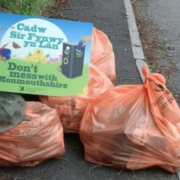Developing an effective litter strategy
Susan Parkinson and Mark Cleaver of Monmouthshire Council discuss the reasons behind the Council’s anti-litter campaign, and process of developing it.
Like many local authorities we have always provided litter bins and responded to requests for litter clear ups in an ad hoc way. Whilst we have been proactive in working with communities on managing litter, whether through the recruitment of volunteer Litter Champions and community litter groups, there has been little attention given to litter prevention and education in a strategic way. To add context to this, there has not been a national focus on litter prevention either, or a recognition of societal and planning changes that have exacerbated litter problems. The last national anti-litter campaign was probably led by the original Wombles of Wimbledon Common in the 1970s.
As an authority we were receiving increasing pressure from a growing number of litter volunteers and members of the public about the endless flow of litter along our roads in particular. While town centres are well served with litter bins and regular street cleaning, the more rural areas receive relatively little attention from cleansing teams.
Changes to consumption patterns of food on the go, internet driven commerce leading to more home deliveries and changes to packaging have all led to a build-up of litter and local frustration that not enough has been done. A broad wellbeing survey of local people revealed that litter was an issue raised by many of them. The final straw was the Blue Planet series which exposed the amount of plastic pollution in our seas, much of it emanating from the land and entering the ocean down rivers.
In response to issues being raised, we met with our volunteer litter champions to consider how to respond to these challenges, particularly in the light of increasingly constrained budgets. It was clear we needed to develop a strategic approach to litter prevention that took account of the changed nature of the issue. A strategy would then allow us to develop a plan aligned to meet today’s litter challenges
We began by examining our data which included how much litter we collect and how much we spend on collecting it, Neither of these empirical data sources were readily available as they are not adequately accounted for. We sought to understand different types of litter, who drops it and why, and researched successful litter campaigns and strategies from other areas. We also looked at legislation, and what enforcement approaches have worked well.
The strategy outlined key thematic areas of work. The education theme of the plan has the most actions, and the enforcement theme is the one that our councillors want to see us put more effort into. Without greater resources in both areas, it will be difficult to make significant progress on either.
The strategy has been through Scrutiny Committee but as yet remains in its draft form, until it can be adopted by the County Council. The process of developing the strategy was a very useful one, primarily because it gave us the opportunity to analyse our own practices, where litter comes from, the psychology of littering and researching current best practice. Although not adopted, we have begun implementing elements of the plan.
We are using a matrix developed by another authority (with slight tweaks to reflect our location) to decide objectively on new bin locations. We are much more active in our approach to education and awareness, writing press releases and posting on social media regarding litter, and in general articles are very sympathetically received. There seems much less acceptance of littering behaviour.
We have developed new signage on littering based around caring for the local environment and wildlife, which fits with other priorities on land management in Monmouthshire that we are implementing. The Welsh Government are developing a national litter strategy and a Welsh national litter campaign, which should help our efforts. A national deposit return scheme will also make a difference, and a consultation in Wales to ban some common single use plastic items has just closed.
There is a huge amount to be done on changing mind-sets and encouraging people to understand the impact of their behaviour with regard to littering. As an authority we are aware that we need to improve our data collection so that we can better understand the impact of campaigns and societal changes on littering behaviour.
• Susan and Mark delivered a presentation on this topic at the APSE Refuse and Recycling Seminar 2020 on 12 November 2020. You can download the presentation here.


.png)



.png)